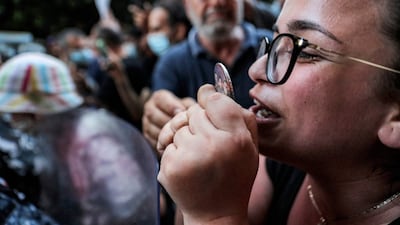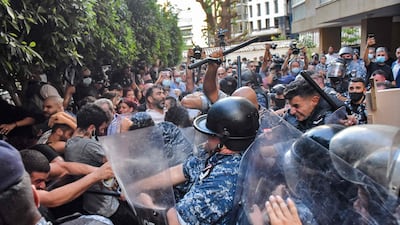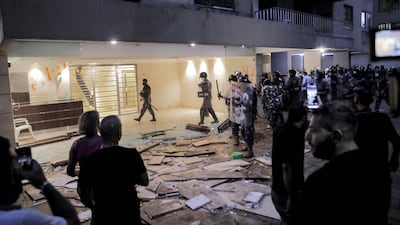Listen to the latest podcast on the Beirut blast here
Lebanon's Parliament on Thursday demanded action against online campaigners who have accused MPs of signing a petition that could impede the investigation into the Beirut blast.
Family members of the victims of the explosion and civil society activists launched a campaign this week to demand that parliamentarians scrap a petition that could pave the way for MPs implicated in the probe to be tried by their peers and evade justice.
The blast last August was caused by the detonation of thousands of tonnes of ammonium nitrate — a fertiliser that can also be used to make explosives — that had been stored unsafely at the port for years.
The resulting explosion was one of the most powerful non-nuclear blasts in history, but the investigation into its cause has yet to produce any results, with weeks to go before the Lebanese capital marks the anniversary of the disaster.
Since the explosion, “some well-known parties have been targeting Parliament and legislators, and yesterday, this targeting campaign reached its climax,” a Parliament communique said.
“The Information Directorate in Parliament calls on the judiciary, especially the investigative judge, to act to stop the abuse directed at his work, and at law and justice.”
Campaigners accused the 28 signatories of the petition of trying to protect their peers from scrutiny after investigative judge Tarek Bitar requested that Parliament lift the immunity of those politicians who are under investigation.
Photographs of the signatories with the blast in the background were shared widely on social media alongside the hashtags “parliamentarians of shame” and “ammonium legislators”, in reference to the chemical that exploded at the port.
The petition is the latest obstacle to the probe, which is taking place in a country renowned for the impunity of its political class, legal experts and families of the victims told The National.
Ibrahim Hoteit, who heads a group for the families of the Beirut blast victims, said the petition was an obstruction of justice.
“We call it the petition of shame. Parliamentarians are trying to delay the investigation,” he said.
The petition followed a request this month from Mr Bitar who sought to strip members of parliament and former ministers Nohad Machnouk, Ali Hassan Khali and Ghazi Zeaiter of their immunity. The investigating judge also asked to interrogate caretaker Prime Minister Hassan Diab and former minister Yousef Fenianos, as well as top security and military officials.
The move sparked hope that high-level officials may be held accountable for the devastating explosion that killed at least 215 people and injured thousands more.
In response to the judge's request, at least 28 parliamentarians signed a petition that would allow MPs to take over the port explosion file and interrogate those accused of negligence in the lead-up to the explosion.
Signatories include parliamentarians from Iran-backed Hezbollah and its Shiite ally Amal but also the Future Movement, headed by former prime minister Saad Hariri.
Five MPs withdrew their support after the online backlash, leaving the petition without the minimum number of signatures required to proceed.
“If it had worked, it would have amounted to politicians interrogating themselves,” Mr Hoteit told The National.
“The battle is not won. We still fear that five other parliamentarians may join the petition at a later time.”
Mr Bitar is the second judge to be appointed in less than a year to lead the probe. Politicians asked for his predecessor to be removed after he asked to question them.
The petition is the first step in trying politicians suspected of negligence by the Higher Council for Prosecuting Presidents and Ministers, a body that is composed of seven parliamentarians and eight judges.
It could strip the Lebanese judiciary of any authority in the investigation, said Wissam Lahham, a university professor and an expert in Lebanese constitutional law.
“No one was ever prosecuted before this council, although the article on it has existed since 1927,” he told The National.
The international community and many Lebanese have blamed the country’s entrenched political class — already accused of failing to remedy a severe economic crisis — of criminal negligence and of failing to deliver justice.
“Legislators have no credibility at all. If they are serious, why didn’t they launch this procedure before? It’s been a year,” Prof Lahham said.
Activating the procedure for the Higher Council requires one fifth of MPs to sign a petition accusing a minister or prime minister of neglect or treason. They must then form a committee that will study the file and present a final report to Parliament.
Parliamentarians must then decide by a two-thirds majority whether to refer the politicians to the Higher Council or drop the case.
Mr Bitar would no longer head the investigation should MPs refer the accused to the Higher Council, Mr Lahham said.
“They are using the law and the legal system to protect themselves instead of using the law to protect society.”













